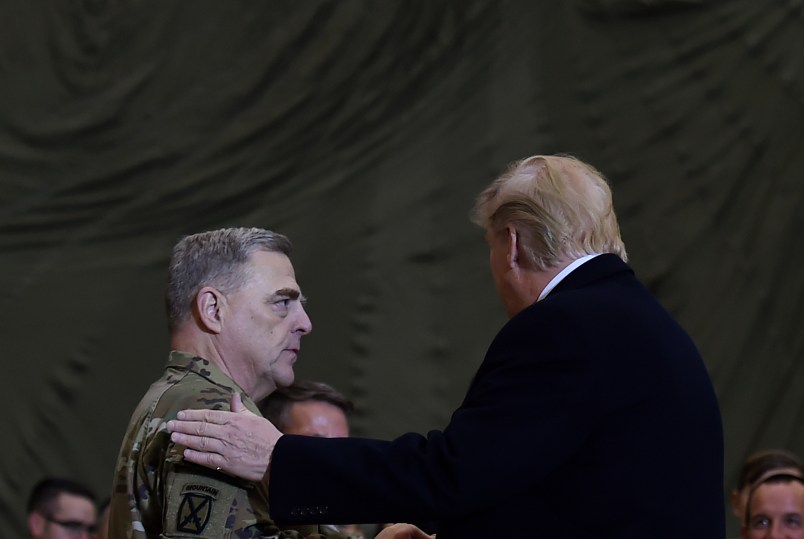We’ve got another Bob Woodward book that has exclusives that read as a bit too good to check. This has always been the thing with Woodward. Since his access has always been purported to be unlike anyone else’s he can have scoops that really no one else can confirm. And … well, that’s okay, apparently. This new book is – interestingly – coauthored by Bob Costa, also of The Washington Post.
The big revelations, at least in the early accounts, are tied to the action of Joint Chiefs Chair, Mark Milley. Milley was apparently afraid China and the US might stumble into a war around the 2020 election, with exercises around Taiwan and increasingly belligerent statements from then-President Trump. To defuse tensions, Milley allegedly twice called his Chinese counterpart to assure him the US was not planning and would not attack China. He did this once just ahead of the election and then again just after the January 6th.
He also reportedly convened a group of top military commanders and ‘reviewed’ the procedures for launching nuclear strikes. He confirmed that the President alone could give such an order but that he, Milley, needed to be “involved,” in Woodward and Costa’s words.
The communications with the chief of the People’s Liberation Army are certainly noteworthy. But military chiefs talk to each other, often in just such cases, to avoid misunderstandings. But there’s nothing inherently improper about them. Certainly nothing unconstitutional.
The nukes stuff is another matter. The last point about his needing to be ‘involved’ is questionable.
The current military chain of command is governed by the 1986 Goldwater-Nichols Act. It says the line of command is from the President to the Secretary of Defense to – I believe – the relevant combatant commander. So the General in charge of Centcom or Pacific Command. I confess I am forgetting precisely how this works with a nuclear launch order. But at least based on my recollection the Chairman does not actually have to be ‘involved’. Of course the subtext of this seems to be not only that he would be ‘involved’ but that he wanted to know what was happening to stop anything that seemed out of order.
Something similar to this happened with Secretary of Defense James Schlesinger in the final days of Watergate when he allegedly told the top Pentagon generals not to take any orders for nuclear strikes without coming to him first.
This is a complicated question since constitutionally many interpreters would say that the President’s power is total. The constitution defines who is in charge, not Goldwater-Nichols. So there’s a largely theoretical question whether these are just guidelines rather than in any sense limitations on the President power. But the bigger issue is one the US has come up against at least twice and looms over the architect of American military power. You have an 18th century document which appears to give the President something like absolute power to command the country’s armed forces. That has been interpreted in such a way as to mean, in effect, the power to initiate military attacks. And that all collides with a state of technology where a berserk President could annihilate much of humanity with a few quick decisions.
It’s not a great interlocking of history and technology. Mostly we’ve had Presidents who were sane enough to keep this all theoretical. Apparently Milley wasn’t so confident.
The most interesting way to see these revelations is as a measure of the relative memory-holing of the events of January 6th. Yes, what Milley did was highly irregular and in the case of nuclear weapons even questionable. But that’s mainly if you’re kind of pretending that we didn’t just have a President lose an election and then try to launch a coup to remain in power. And when that didn’t work he roused up a mob of violent supporters who stormed the seat of government with the intention of overthrowing the results of the election by force. In other countries, especially those who are military rivals of the US, they’re free to see such a situation for what it is: seriously scary shit that raises doubts about who is in control of the country’s military, its vast nuclear stockpile and the state itself.
We forget that at the time, Vice President Pence actually paused for some time before releasing a statement that he would not invoke the 25th Amendment to remove the President from office. It was not treated as a crazy idea.
Today, for all the talk about January 6th, the cavalcade of defendants, the special investigative committee, we still largely act like it didn’t happen. The instigator remains head of his political party. It’s treated as a given that he will be their candidate for President in 2024 if he chooses to run again. The heads of his congressional party are threatening retribution against private companies that honor lawful subpoenas tied to investigating what happened.
Milley’s actions are mostly shocking because our political culture is committed to pretending the events in question never happened.









